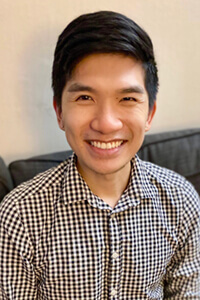September 14, 2020
 Meet MPA Talks speaker Garseng Wong ’11! Garseng attended MPA from grades 4-12 and went on to study Human Biology at Stanford University. He concentrated on nutrition and chronic disease management and initially thought about working as a primary care physician to continue this interest, but during his time in medical school at NYU, pivoted to psychiatry because the field afforded him more time to get to know patients deeply and personally. He is currently a resident psychiatrist at NYU and hopes to specialize in child-adolescent psychiatry, focusing his work with queer youth and young adults long-term. Get to know more about Garseng before MPA Talks on September 30 with the Q&A below!
Meet MPA Talks speaker Garseng Wong ’11! Garseng attended MPA from grades 4-12 and went on to study Human Biology at Stanford University. He concentrated on nutrition and chronic disease management and initially thought about working as a primary care physician to continue this interest, but during his time in medical school at NYU, pivoted to psychiatry because the field afforded him more time to get to know patients deeply and personally. He is currently a resident psychiatrist at NYU and hopes to specialize in child-adolescent psychiatry, focusing his work with queer youth and young adults long-term. Get to know more about Garseng before MPA Talks on September 30 with the Q&A below!
What will we learn from your MPA Talk?
In my MPA talk, I would like to compare and contrast mental health as it is portrayed in the media and discussed in the lay public versus our conceptualizations as a profession. I hope to offer a space to discuss and de-stigmatize mental health, and introduce skills and ideas for maintaining mental health as students progress through school and develop as young, independent adults.
What do you believe will be the greatest challenge our current students will face in their lifetimes and how do you see MPA equipping them to face that challenge?
Our society has become extremely polarized to the point where communication between people of opposing ideologies often become shouting matches without any exchange of ideas. This is worsened by the growing sentiment against evidence and the blurring of “truth.” Our students will have to become effective communicators with those who do not share their point of view in order to advance in their lives and careers, especially for those who hope to tackle our nation’s (or world’s) great challenges. I see MPA equipping students for this future by introducing them to big, controversial ideas early and asking them to consider issues from multiple perspectives.
We ask our students to dream big and do right. Do you feel that call to action is important to the future of our society and if so, why?
One pervasive theme I’ve noticed in my clinical work is that mental distress inevitably crops up whenever someone experiences a loss of purpose, of the thing that gets them out of bed every day. Our society absolutely needs future leaders and heroes bringing in new energy, fresh ideas, and the open-mindedness of a young mind. But I implore students to “dream big” as an act of self-love; finding one’s call of action will bring the meaningful satisfaction that everyone craves in their lives, that ultimately becomes so much more important than money or fame. Helping others makes it all the sweeter!
What book are you currently reading? Would you recommend it?
I’m working through “How to be an Antiracist” by Ibram X. Kendi and would absolutely recommend it! It has been an excellent overview of how pervasive and insidious racism manifests in our country, and provides tangible examples to bring those concepts to light. As the book teaches, race is an emotionally charged topic that keeps people from talking about it, but that very silence is what allows it to fester. The first step to opening up this conversation is doing the work to educate ourselves so that we can become more aware about where and how racism shows up on a day-to-day basis.
Who inspires you to be better and how?
My mom remains the most inspirational person in my life. Her life story, how she grew up in a rural, impoverished village and persevered through the many hardships of moving to a new country without the language or an education all in order to foster a better future for her children, embodies the spirit of “dream big, do right.” It reminds me that hard work and dedication is key to breaking through barriers, especially those we impose on ourselves. However, I recognize and validate that increasingly, especially for folks who are disadvantaged by our society, hard work can only bring one so far, and we as a society should work to create equity and help others realize their potential.
What have you created that you are most proud of?
In college, I formed a small dance project with some fellow queer Asian dancers, and together we created a piece meant to break away from the heteronormative norms we saw in our dance community. We carved out a space to freely express feminine movements that felt authentic to our identities and ended up with a real crowd-pleaser, in part because I think that authenticity and freedom resonated with the audience.
We are so excited and proud to feature Garseng Wong ’11 for MPA Talks! This year’s MPA Talks is going virtual, and MPA community members, specifically alumni, will be given the platform to share their stories and knowledge through the series this fall. MPA Talks this year will be a platform devoted to the voices of people of color and be live on Facebook. Save the date for September 30, 2020 to join us at 6 PM!